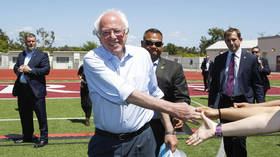Pollution is racist? Science pressed into the service of ideology is second-rate propaganda

To the list of things we can blame on racism, add air pollution. That's the clickbaity conclusion of a US National Academy of Sciences study, adding more fuel to the fire of ideologically-driven science not worthy of the name.
The conclusion sounds breathtakingly simplistic, given all the factors involved – but this is a paper published by the prestigious National Academy of Sciences, the most esteemed scientific body in the US. Surely their peer review wouldn't let an unscientific study sneak through to publication just because it happens to back up their preferred sociological narrative?
"Is it fair [that] I create more pollution and somebody else is disproportionately affected by it?" asks Jason Hill of Clark University, one of the paper's authors. Hill, USA Today takes care to point out in its writeup of the study, is white. We can infer from context clues that he feels pretty guilty about that. We are not told his socioeconomic background, but he does acknowledge that the reason for the study's results is that "on average, whites tend to consume more than minorities. It's because of wealth."
One of the earliest lessons a scientist learns is that correlation does not equal causation. Two things that frequently occur together are not necessarily linked in a cause-and-effect relationship. The data from this study prove not so much that white people are forcing their pollutants on defenseless minorities, but that poor people suffer disproportionately from air-pollution-related illness and death due to the emissions of the wealthy. The researchers admit it themselves. Those poor people happen to have darker skin than their wealthy counterparts, but this is correlation – not causation. Why, then, is the study pitched as an "air pollution race gap?"
It is worrying to see science pressed into the service of ideology, especially an ideology that promotes racial resentment, guilt, and division. Imagine if the data were presented as scientific grounds to demand nationwide redistribution of wealth on the grounds that all Americans must breathe equally polluted air – such a study would be rightly dismissed as Marxist propaganda, even though the numbers would not change and the base conclusion – that the poor are, quite literally, eating the rich's dust – is true. But the ideological gloss would be as wrong as the racialized conclusions drawn by the Clark University team. However, in the US, where we pretend there is no such thing as class and that even the poorest are merely one good hoist of the bootstraps away from wealth beyond their wildest dreams, the powers that be reach for racism again and again to explain away injustice.
Also on rt.com Don’t forget to file your taxes, America, because Amazon paid ZERO to Uncle Sam last year!Not that racial injustice is a myth – minorities are much more likely to be arrested, incarcerated, handed longer sentences, and executed. Structural racism exists, and should be addressed at the policy level. But catastrophizing about an "air pollution race gap" solves no problems, and merely creates more talking points for those who seek to keep the downtrodden at each others' throats instead of realizing they have an oppressor in common.
Perhaps preparing for this eventuality, the wealthy have decided their wealth confers minority status of their own– or so says former Starbucks CEO and would-be president Howard Schultz, who coined the euphemism "people of means" to weasel his way out of an interview question about whether billionaires have too much influence in society. Without the billionaires, who's going to fund science?
Helen Buyniski, RT
Think your friends would be interested? Share this story!
The statements, views and opinions expressed in this column are solely those of the author and do not necessarily represent those of RT.














